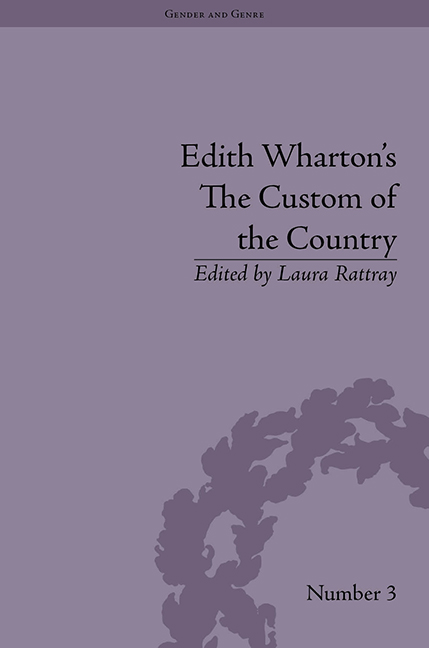Book contents
- Frontmatter
- CONTENTS
- Acknowledgements
- Editorial Note
- List of Contributors
- List of Figures
- Introduction
- 1 The Custom of the Country: Edith Wharton's Conversation with the Atlantic Monthly
- 2 When the Reading Had to Stop: Readers, Reading and the Circulation of Texts in The Custom of the Country
- 3 ‘Don't Cry – it ain't that Kind of a Story’: Wharton's Business of Fiction, 1908–12
- 4 Worst Parents Ever: Cultures of Childhood in The Custom of the Country
- 5 Crude Ascending the Staircase: Undine Spragg and the Armory Show
- 6 ‘It's Better to Watch’: Compulsive Voyeurism in The Custom of the Country and The House of Mirth
- 7 A ‘Mist of Opopanax’: Mapping the Scentscape of The Custom of the Country
- 8 Landscape with the Fall of Undine
- 9 Girls from the Provinces: Wharton's Undine Spragg and Cather's Thea Kronborg
- 10 Men at Work in The Custom of the Country
- 11 ‘Lost in Translation’: Financial Plots and the Modernist Reader in The Custom of the Country
- Notes
- Index
7 - A ‘Mist of Opopanax’: Mapping the Scentscape of The Custom of the Country
- Frontmatter
- CONTENTS
- Acknowledgements
- Editorial Note
- List of Contributors
- List of Figures
- Introduction
- 1 The Custom of the Country: Edith Wharton's Conversation with the Atlantic Monthly
- 2 When the Reading Had to Stop: Readers, Reading and the Circulation of Texts in The Custom of the Country
- 3 ‘Don't Cry – it ain't that Kind of a Story’: Wharton's Business of Fiction, 1908–12
- 4 Worst Parents Ever: Cultures of Childhood in The Custom of the Country
- 5 Crude Ascending the Staircase: Undine Spragg and the Armory Show
- 6 ‘It's Better to Watch’: Compulsive Voyeurism in The Custom of the Country and The House of Mirth
- 7 A ‘Mist of Opopanax’: Mapping the Scentscape of The Custom of the Country
- 8 Landscape with the Fall of Undine
- 9 Girls from the Provinces: Wharton's Undine Spragg and Cather's Thea Kronborg
- 10 Men at Work in The Custom of the Country
- 11 ‘Lost in Translation’: Financial Plots and the Modernist Reader in The Custom of the Country
- Notes
- Index
Summary
Smells are surer than sounds or sights
To make your heart strings crack –
Rudyard Kipling.Following a vaporous trail of smells, aromas, perfumes, pongs and odours, this essay will attempt to map the osmographical terrain, the scentscape, of The Custom of the Country. Bringing various features into focus through the lens of Edith Wharton's practices elsewhere, it will suggest some ways that Wharton's work engages with the languages of olfaction at the turn of the twentieth century; and will indicate how, in her rendering of this most nebulous and neglected of senses, she anticipates some of the features only now being systematized in modern cultural studies. Often seeming ‘involuntary’ or not amenable to individuals’ control, the operations of smell can heighten for the reader the significant histories of Wharton's major characters, and help to calibrate her representation of larger sociocultural territory, and the dynamics of change.
Opening his study Osmics: The Science of Smell with Rudyard Kipling's resonant lines above, John H. Kenneth adds a qualifying note: ‘owing to a lack of training, one is not always aware of the fact that one lives in a world of smell as well as in a world of form, colour, and sound’. This comment, in 1922, seems surprising, given the widespread interest in smells – osmics, olfaction, aromatics, perfume, scents, the aesthetics, ontology, physiology and hygiene of odours – manifested in a plethora of inquiries from the mid-nineteenth century on.
- Type
- Chapter
- Information
- Edith Wharton's The Custom of the CountryA Reassessment, pp. 101 - 114Publisher: Pickering & ChattoFirst published in: 2014



